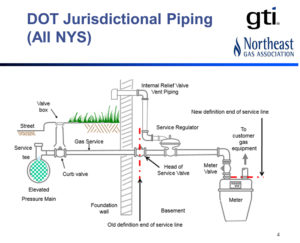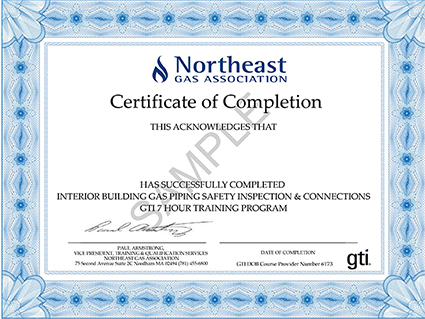NYC Licensed Master Plumber Interior Gas Piping Safety Inspections & Connections Training Program
Scope & Applicability
Historically, construction and maintenance of interior gas piping systems within New York City has been the responsibility of the building owner using Licensed Master Plumbers. This included gas service line piping from the first fitting inside the building at the point of entry through the outlet of the meter, consistent with NYS Department of Public Service (DPS) gas safety requirements. Federal Department of Transportation (DOT) jurisdictional piping under 49 CFR Part 192 however is defined as all piping through the outlet of the meter, regardless of meter location. Recent changes in NYS Pipeline Safety code have resulted in changes to the definition of a service line to parallel the federal definition. Because of this change, maintenance and construction work performed on interior DOT-jurisdictional service line piping (piping from the point of entry, POE, through the outlet of the meter) must be performed by appropriately trained and qualified personnel under the Operator Qualification Program (OQ). In addition, the change in definition resulted in the need to conduct mandated safety inspections of interior DOT-jurisdictional piping including visual inspection for atmospheric corrosion and leak surveys of visibly accessible piping through the outlet of the meter.

(Click to enlarge)
This diagram clearly illustrates how the change in state regulations of the definition of a service line impacts ALL NYS jurisdictional gas piping systems including interior building piping systems in NYC. In order to align with the federal definition of a service line, NYS regulations changed the definition in the state code from the first fitting inside the building wall (the first red line above) to the outlet fitting of the gas meter (second red line) consistent with Federal pipeline safety requirements. All piping up to the outlet fitting of the gas meter, no matter where that meter may be located, falls under the jurisdiction of the federal and state regulations in addition to local authority having jurisdiction (AHJ) rules (NYC DOB). This piping includes valves, pipe, fittings, regulators, regulator vent piping, the vent terminus, meter fittings and the meter itself. This piping is referred to as DOT jurisdictional piping. Everything from the inside point of entry (POE) up to the outlet fitting of the gas meter falls under the federal and state definition of a service line and in NYC, MUST meet NYC DOB Requirements as well as requirements of local gas Utility Operators.
Several recent gas related incidents in NYC have resulted from improper connections including theft or diversion of service. Local policy makers sought local regulatory change to enhance gas safety within NYC including mandating periodic interior gas piping inspections from the point of entry (POE) through to the tenant space and accessible end-use equipment essentially covering all piping in commercial buildings, 3 family or greater. These overlapping inspection requirements were analyzed through a collaborative of NYC LMP’s, including the Master Plumbers Council, local gas Utilities (Con Ed & National Grid) and The Northeast Gas Association, under the leadership of The Plumbing Foundation City of New York. The goal was to provide the most effective and efficient inspection process for building owners that maximizes public safety value. Further compounding the challenge of regulatory change, local gas Utilities were driven to enhance current operating procedures to mandate all connections made to DOT-jurisdictional piping be made by a DOT Operator Qualified person.
The Interior Building Gas Piping Gas Piping Safety Inspections and Connections GTI training program was sponsored by local NYC Utility Operators working with the Northeast Gas Association (NGA), The Plumbing Foundation of New York, The Master Plumbers Council of New York City and the UA Local 1 Trade Education Training Center. The program content was developed by the Gas Technology Institute (GTI)1 . The scope of this program includes training necessary to prepare for LMP’s and their technicians for competency testing and membership in the Operator Qualification Program provided by the Plumbing Foundation of New York. Successful completion of the GTI training program is an integral component and a prerequisite for membership in the Plumbing Foundation OQ Program. The scope of this training includes the following focus areas for interior building gas piping systems:
- Review of regulatory requirements
- Characteristics of natural gas
- Use of Combustible Gas Indicator (CGI) instruments
- Recognizing, assessing and responding to atmospheric corrosion
- Conducting mandated leak surveys of visibly accessible piping
- Understanding abnormal operating conditions (illegal & substandard piping conditions)
- Purging flammable gas from interior piping
- Making connections to DOT jurisdictional piping
- Inspection documentation and notification requirements
- Con Ed & National Grid specific procedures for conducting DOT mandated piping safety inspections
The program is designed with a gas safety focus to enhance existing comprehensive technical training already required of LMP’s and their technicians. As such, participants are expected to have day-to-day technical experience working with gas piping systems, pipe joining, familiar with local, state and federal building codes as applicable to their scope of work. This training IS NOT intended for new technicians with little or no on-the-job experience in maintenance and construction of gas piping systems. The focus of this training is to reinforce fundamental awareness of situations to prevent a gas incident; identify corrective action and preventive maintenance measures and notification requirements. In addition, the training specifically focuses on execution of comprehensive interior gas piping safety inspections necessary to meet both Local Law requirements within NYC and DOT / NYS requirements under the Pipeline Safety Regulations and prepares an individual for Operator Qualification (OQ) testing to enable LMP’s to make connections to DOT jurisdictional piping2.
Two new NGA Operator Qualification Tasks were developed in collaboration with NGA membership and The Plumbing Foundation that enables LMP’s to conduct the abovementioned safety inspections and make connections to DOT jurisdictional piping.
These Tasks include:
- Task 86 – Conducting Interior Jurisdictional Piping Safety Inspections
- Task 87 – Conducting Interior Jurisdictional Piping Construction and Maintenance Activities
In summary, LMP’s and their technicians are some of the most highly qualified service providers within the City of New York. This training program coupled with existing programs will significantly enhance awareness around gas pipeline safety and provide yet another layer of protection in preventing gas related incidents.
NOTE:
GTI has authorized the Northeast Gas Association, working with the Master Plumbers Council of The City Of New York and UA Local 1 Trade Education Training Center to provide instructor-led training using the program content. Instructors MUST complete the Train-The-Trainer requirements of the Northeast Gas Association and successfully demonstrate competency by successfully completing NGA Operator Qualification Task 86/87 written and practical exams. The training programs and testing are currently offered in English by authorized instructors.
For further information regarding training class schedules and availability please contact:
- UA Local 1 Training Center – http://www.ualocal1.org (718)752-9630
- City of New York Master Plumbers Council – http://www.nycmpc.org/default.aspx 718-400-8444
For Operator Qualification Program questions and requirements please contact:
- The Plumbing Foundation of New York – www.plumbingfoundation.nyc (212) 481-9740

1 The Gas Technology Institute developed the training program content in conjunction with the Collaborative. GTI is approved by The State Education Department, The University of the State of New York and as a Course Provider by NYCDOB Course Provider ID 6T73. GTI is an industry recognized gas safety training program provider.
2LMP’s and their Technicians seeking Operator Qualification status should contact the Plumbing Foundation of New York PRIOR to registering for training classes that are part of this program.

